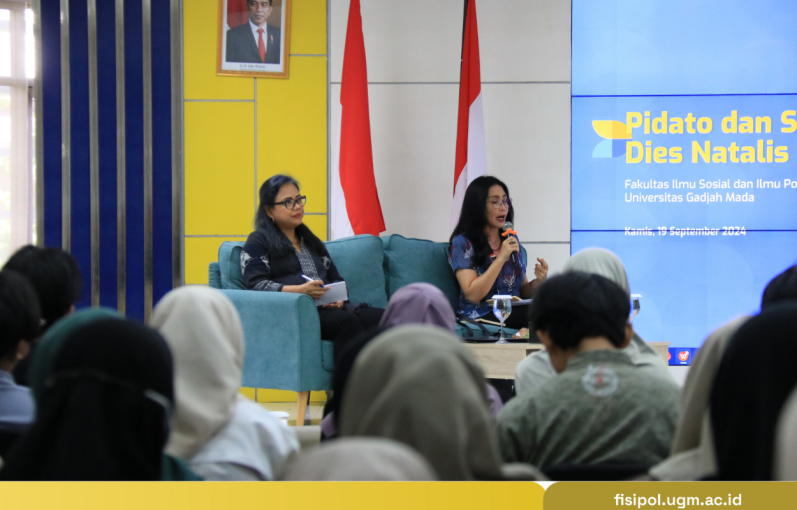
Yogyakarta, 19th of September 2024—As a response towards government actions in preserving democracy, UGM’s Faculty of Social and Political Science initiated a campus civic movement in the National Seminar for Fisipol UGM’s 69th Dies Natalis. This event was held on Wednesday (19/9), with the theme of “Campus Civic Movements in Response to the Regression of Democracy, Digital Disruption and Ecological Crises”. The dialogue on the regression of democracy discussed three topics, with speakers ranging from experts, politicians, and academics.
The regression of democracy is not only indicated by the rise of elitism and centralism in the democratic processes. Prof. dr. Ova Emilia, M.Med.Ed., Sp.OG(K)., as the Rector of Universitas Gadjah Mada, mentioned her concerns regarding the lack of public space to mobilize in this current democracy. “The advancements of technologies widened the opportunity for further participation by the people. But, this openness must be in line with the principles and commitments of safeguarding the morals of democracy,” mentioned Prof. Ova.
The perversion of democracy, which has become even worse due to digital advancements, has claimed another victim, that is the people. Economic turmoil, rise of unemployment, polarization of politics, as well as massive spread of hoaxes can negatively impact the lives of the ordinary people. Prof Ova added that campuses, in pair with the government, are supposed to be the catalyst for solving public problems. Unfortunately, the regression of democracy became one of the many obstacles in initiating campuses to collaborate with the government.
“We are currently in an era where democratization does occur, but it is both nominal and procedural at best. Due to this, we need to bring back the more substantial aspects, and guarantee that democracy can show its usefulness for the people,” explained the Dean of Fisipol UGM, Wawan Mas’udi, S.IP., MPA, Ph.D. in his speech. The current situation of our ever-more alarming democracy has forced campuses to mobilize. How campuses respond to this problem will greatly affect the fates and welfare of the ordinary people.
In this discussion, the three speakers present spoke out about their perspective in processing the phenomenon of the regression of democracy. Dr. Rieke Diah Pitaloka, S.S., M.Hum, who is currently serving in the Indonesian Parliament (DPR), highlighted how the government itself has systematically created this crisis of democracy. He mentioned that as the “banality of evil” in between powerful leaders. This term refers to the evils created systematically and that this evil has blurred the lines between what is good or evil.
“The banality of evil was not born out of the group of people with low social, economic, and education status. Instead there seems to be a forgotten process of thinking, the process of differentiating the good and the evil,” mentioned Rike. The phenomena of banality shows that there are relations between the actor and the system. The actor will most likely skip the part where they are thinking with conscience. After that, they will think that the evils that they have committed are actually normal and they will continue to repeat such acts.
It is very unfortunate that the banality of evil is happening in our government right now. Because of that, the current principles of democracy became nothing more than procedures, without any more democratic values. Bivitri Susanti, as a constitutional law expert, said that our current democracy is like an “empty shell”. The nature of countries are shaped by the people giving the mandate to the leader. The process of democracy will continue to work when the people have the power to participate in politics.
“The regression of democracy happens when democratic regression by politicians are not met by opposition but cheers by the people. Even though, these people who are elected democratically will be the ones who deal the blow to our current democracy,” added Bivitri. This act shows autocratic legalities, where all acts are considered as legal acts now. Normally, this violates the principles of democracy.
In line with this way of thinking, sociologist and vice rector of UGM, Arie Sujito, S.Sos., M.Si. reiterated that Universitas Gadjah Mada has both moral and historical responsibilities in nation building. The community service programmes rolled out by UGM are done with the aim of building characters of students so that they become more in touch with the ordinary people. Campuses should be able to guide and mold a generation that is not apathetic towards national conditions and situations. “I think that universities have their own challenges and obligation in escorting academics to solve national problems,” he closed.
This seminar, which was attended by more than 200 people, is expected to be able to rekindle the spirit of campus and the people to safeguard democracy. The seminar also became a contribution from Fisipol UGM in achieving SDG 4, that is quality education.
